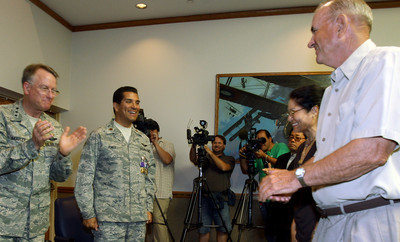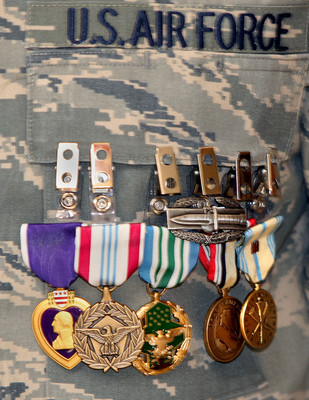Major honored for Iraq bravery


After receiving the Purple Heart medal and five other awards for courageous service in Iraq, Air Force Reserve Maj. Anthony E. Jones on Monday shared his motto with fellow airmen, his family and friends:
“Any day above ground is a good day. Today is another good day,” Jones, 51, of Las Vegas, said at the conclusion of the ceremony at the Nellis Air Force Base Officers Club.
On two occasions last year during rocket attacks, he could easily have wound up six feet below ground, but his brushes with death were just that.
In the end, he managed to help in the search for survivors at Camp Victory and, two weeks before that attack, he rendered medical care to other U.S. military personnel while under fire.
And like his father, Walter Jones, who received a Purple Heart medal for leg wounds from a mortar attack during the Vietnam War, Anthony Jones lived to tell about it.
“I was just overwhelmed with adrenaline,” he said before the ceremony, describing how on Oct. 25, a barrage of 107mm rockets rained down on the camp. The explosion from one about 15 feet away thrust him against a concrete barrier. He was knocked unconscious and his back was peppered with shrapnel. A short time later he regained consciousness.
“My hands, feet and eyes were working. So I pulled open the door that was jammed on the trailer I was heading to and got on my hands and knees and cleared the area.”
No other occupants were found inside the darkened trailer, but when he came out, someone noticed he was bleeding. He was then taken by helicopter to a combat support hospital in Baghdad’s Green Zone.
For that, the Air Force Reserve Command commander, Lt. Gen. John A. Bradley, clipped a Purple Heart medal to the breast pocket flap of Jones’ basic duty uniform.
That was followed by Bradley presenting him with the Defense Meritorious Service Medal for leading combat personnel recovery operations that, in all, saved 90 lives, Bradley said. Jones, who has lived in Las Vegas since 1986, volunteered to go to Iraq where he was director of the Army Personnel Recovery Coordination Cell. A former C-130 pilot, he drew on his special operations experience with the 8th Special Operations Squadron at Hurlburt Field, Fla., to provide expertise to senior military leaders in Iraq.
Because of the classified nature of his work, he couldn’t describe in detail what he did, but he specialized in orchestrating search-and-rescue operations and recovering soldiers, Marines, sailors and airmen who were lost in combat or kidnapped.
His service career includes Operation Urgent Fury in Grenada in 1983, and serving in operations Desert Shield and Desert Storm in the early 1990s. He entered the Individual Ready Reserve program after leaving active duty in 1992.
Following the Sept. 11, 2001, terrorist attacks, he volunteered his skills and experience for the Air Force Reserve.
Six years later, on Sept. 11, 2007, and after less than two weeks on the job as recovery cell director, he found himself in the middle of a rocket and mortar attack outside coalition headquarters at Al Faw Palace. A 240mm rocket exploded about 100 feet away, blowing him to the ground, Nellis officials said.
“I heard a screaming sound,” he said in an interview before Monday’s ceremony. “One person died. … I was alive and able to help.”
Although he suffered a concussion, Jones immediately began cutting shirts off his injured comrades and assessing their wounds. With a medical kit that he always kept handy, he tended to the most severely wounded and helped set up a triage area.
Rockets struck Camp Victory again on Oct. 10. He heard an explosion and once again grabbed his medical bag and ran to the scene where he found a truck that had taken a direct hit and was leaking fuel.
He helped rescue two soldiers who were trapped inside and gave them life-saving treatment. His “exceptional courage” for his actions that day was noted in the citation for the Joint Service Commendation Medal he received Monday.
At the ceremony, Jones, who is attached to the 99th Air Base Wing at Nellis, noted that he was inspired by the others who pitched in to help.
“I wasn’t the only one. … There were other soldiers (and personnel) from the Army, Navy, Marines. They didn’t take shelter. They were running toward the fight, not away from the fight,” he said. “If I learned anything from that it is training. You fall back on your training.”
Walter Jones said after the ceremony that the experience that left his son with shrapnel wounds was about the same as the mortar attack in 1968 that pelted his lower leg with shrapnel during the siege of Khe Sanh.
His son said he thinks the U.S.-led coalition troops are winning the war in Iraq.
“I saw the surge,” he said. “I saw Shiite and Sunni turning in al-Qaida. We’re making headway, but I think we’ll be there for a long time.”
Contact reporter Keith Rogers at krogers@reviewjournal.com or 702-383-0308.












